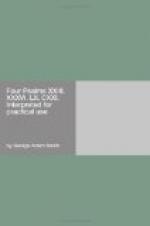II. But the Psalm is not only theology. It is personal religion. Whether the Psalmist sang it first of the Church of God as a whole, or of the individual, the Church herself has sung it, through all generations, of the individual. By the natural progress of religion from the universal to the particular; by the authority of the Lord Jesus, who calls men singly to the Father, and one by one assures them of God’s Providence, Grace and Glory; by the millions who have taken Him at His word, and every man of them in the loneliness of temptation and duty and death proved His promise—we also in our turn dare to believe that this Psalm is a psalm for the individual. The Lord is my shepherd: He maketh me to lie down: He leadeth me: He restoreth my soul. Lay your attention upon the little word. Ask yourself, if since it was first put upon your lips you have ever used it with anything more than the lips: if you have any right to use it: if you have ever taken any steps towards winning the right to use it. To claim God for our own, to have and enjoy Him as ours, means, as Christ our Master said over and over again, that we give ourselves to Him, and take Him to our hearts. Sheep do not choose their shepherd, but man has to choose—else the peace and the fulness of life which are here figured remain a dream and become no experience for him.
Do not say that this talk of surrender to God is unreal to you. Happiness, contentment, the health and growth of the soul, depend, as men have proved over and over again, upon some simple issue, some single turning of the soul. Lives are changed by a moment’s listening to conscience, by a single and quiet inclination of the mind. We must submit ourselves to God. We must bring our wills under His. Here and now we can do this by resolution and effort, in the strength




